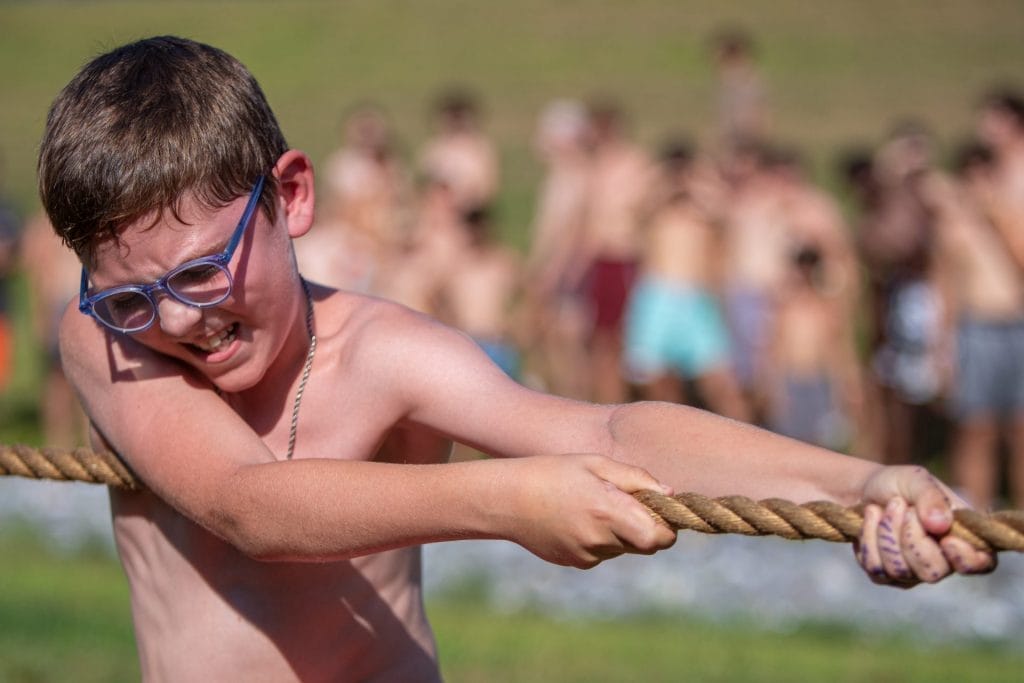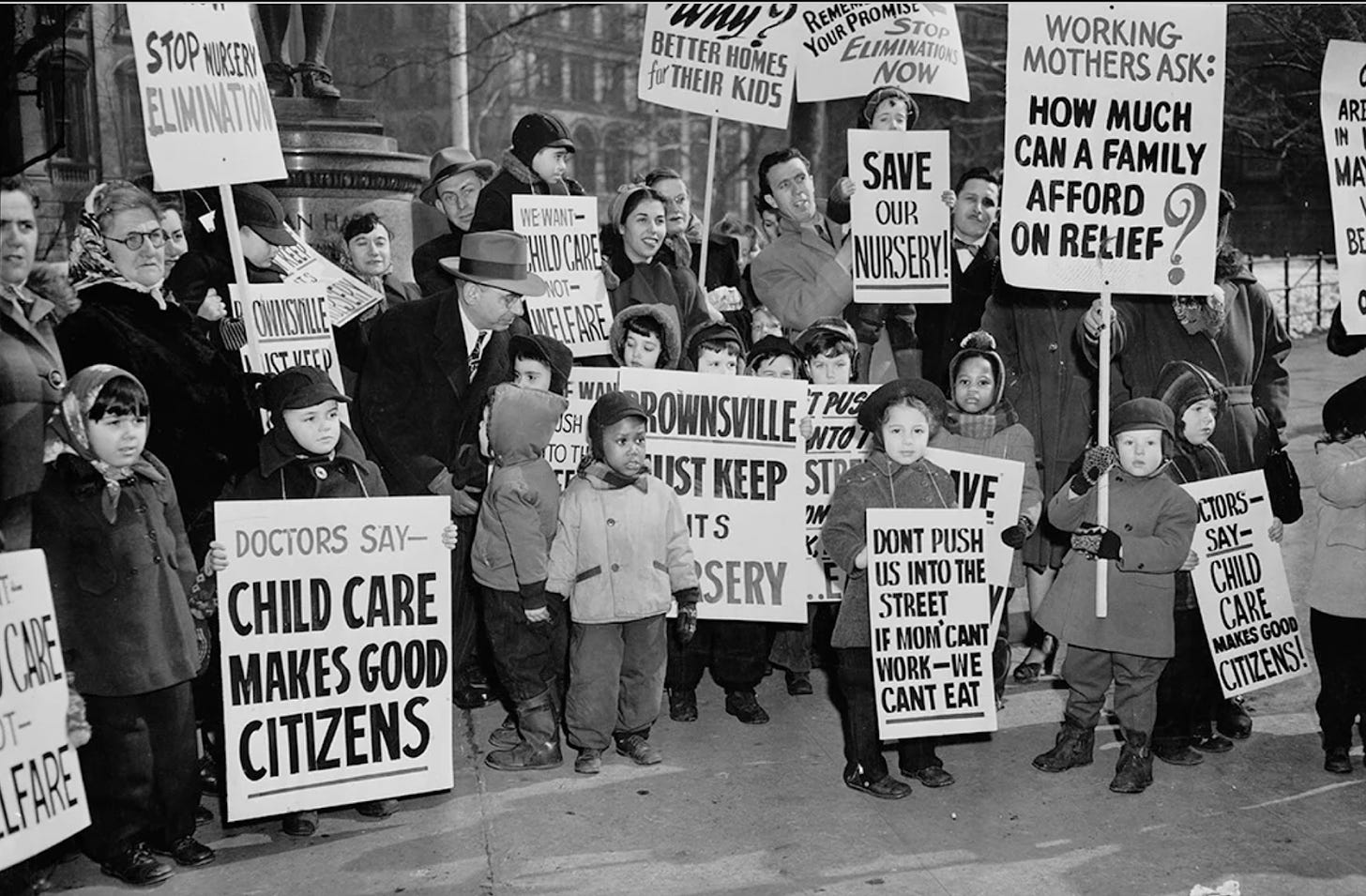

Discover more from The Double Shift
The “Every Family For Themselves” Fight for Summer Camp
The camp gods are adding a new level of difficulty to my plate: summer camps for twin four-year-olds. - 17 JAN 2024
Did someone forward you this newsletter? Subscribe for free here. However, paying membership is what makes this newsletter possible. Plus, you get audio newsletters, hangouts, and more. It starts at $7/mo. Join us!
Before I get started, and just wanted to say thank you to everyone who wrote me about my hard business decision about whether to switch from Ghost to Substack. I really appreciate your insights and encouragement as I figure out the best path forward. xo.
It’s January in America, so as soon as you finish putting away your holiday decorations, that means it’s time to talk about the messed-up system of privatized childcare we call summer camp! Last January, in honor of many private camp registrations opening during the first month of the year, I wrote about some of the history of why we are stuck with a patchwork system of care that’s expensive, convoluted, and getting harder and harder to get. Since then, my colleague Rebecca Gale has done great work highlighting how summer is even more of a nightmare for families who have kids with disabilities and neurodivergence. I’ve also written about how we are closing off more and more public spaces to children and deeply limiting opportunities for age-appropriate independence, making summer camp even more necessary for kids of all ages. Please enjoy marveling at the tale of my brother’s best friend Patrick, who not so long ago (in the 90s) spent his entire summer at the neighborhood pool chatting with lifeguards and eating nachos from the snack bar with no direct parental supervision, starting at age seven.
So let me dive into my current January challenge. Since I’ve basically got a handle on my older son’s summer needs, the camp gods are adding a new level of difficulty to my plate: summer camps for twin four-year-olds. We aren’t putting the twins in camp all summer, but based on our experiences last year, they definitely need some structure and socializing beyond just being with a caregiver for 12 weeks for all of our sanity. Plus, our caregiver starts her college two weeks before our kids start their public school, so we have some gaps. In my opinion, four is the worst age for summer camp; there aren’t a lot of options because a lot of kids are still enrolled in full-time daycare at that age, and the hours and weeks offered are even more whimsical than camps for older kids. So, I am currently refreshing a random gymnastics studio website on January 8th (the day they said they were posting their camps) because they are one of the only places I can find that take four-year-olds and nine-year-olds AND are open in August. My older son will probably have a fit because it’s a new (to us) camp that none of his friends go to, but our family truly can’t handle multiple time, logistics, and location drop-offs this summer. Last year we spent $4000 on camps for my older son. This year will be quite a bit more because we are adding some weeks for the twins. It’s hard to not feel wildly exasperated about getting on this merry-go-round for another year.
So in honor of the January summer camp frenzy, I’m lightly editing and revising this newsletter from last year, “The Little-Known History of Your Desperate Summer Camp Struggle.” But this January, I’m not just going to remind you of the frustrating history that led us here. In next week’s newsletter, I’m going to share some ideas for creative solutions for breaking out of this expensive, individualistic hellscape. So stay tuned!
So here's a revival of last year's history of your desperate summer camp struggle. Enjoy!
Probably many of the readers of this newsletter have had the same feelings of despair about childcare costs and have been stressed about how hard it is to get. When discussing the childcare crisis, the 0-5 age range rightfully gets a lot of attention. But we need to keep the drumbeat going on the reality that when you start dealing with aftercare and summer camp, (also known as “out-of-school-time”) the problems continue even after kids are enrolled in school.
Instead of being resigned about this, I want people to be angry about it. You may have a vague awareness that things aren’t this bad in other countries, but I think too few people know our own American history about the deliberate decisions that led us here.
In 1967, the National Organization for Women put childcare at the center of their Bill of Rights, asserting that quality childcare should be seen as a public good and funded similarly to libraries, parks, and public schools. Childcare access was positioned not only as an essential service for the increasing numbers of mothers entering the workforce but more generally for women to contribute to society in any way they saw fit. Universal childcare wasn’t initially envisioned as merely a tool to enable women to work in traditional 9 to 5s. It was conceived as a necessary right in order for women to have time for themselves – for their own interests, activism, and self-actualization outside the lonely drudgery of raising children in a nuclear family.
Organizers like Rosalyn Baxandall opened childcare co-ops like Liberation Nursery on the Lower East Side of New York City, which worked both as childcare but also as a hub of community organizing. Radical feminists worked on the local level for funding to support their vision, which included deliberate challenges to family structure, like pushing for access to 24 hours a day of care, for infants to young adolescents, regardless of income or marital status. Black feminist Dorothy Pitman Hughes organized 150 community organizations in New York to get funding and challenge antiquated childcare center regulations. Inspired by the protest movements of the times, these feminists would block streets and traffic in Manhattan to create makeshift protest nurseries to demand public funds. They had sit-ins with small children and mothers and staged protests where they changed diapers on politicians’ desks.
In 1969 and 1970, public opinion polls showed the general idea of the government shouldering some or all of the cost of childcare enjoyed wide bi-partisan public support, including from President Richard Nixon. But as discussion of federal legislation made its way through Congress in 1971, factions split over the best path to success. Some anti-poverty activists felt the priority should be funding free childcare to those with the most need, while others thought the coalition should be built around universal access, regardless of income. According to the excellent book Feminism’s Forgotten Fight: The Unfinished Struggle for Work and Family, accusations flew that the universal childcare position centered on the needs of middle-class and wealthier white women “who just wanted to go to art galleries” at the expense of the needs of poor families. Radical feminists’ push for childcare as a tool for women’s economic self-sufficiency and personal liberation didn’t jive with more mainstream liberals. The demand for funding 24-hour childcare was met with suspicious fears of maternal abandonment. In 1971, The Comprehensive Child Development Act which would have allocated billions of dollars for a national daycare system passed both houses of Congress.... and was vetoed by Richard Nixon.
It’s not just heartbreaking that he vetoed it, but what’s devastating is that the way he framed his veto basically stalled efforts for decades for federal support for childcare. While some conservatives feared locally controlled childcare centers would promote integration and socialism or just be too expensive overall, Nixon took a wider angle as he aligned himself with the emerging anti-feminist, “pro-family” New Right. His veto was written by Pat Buchanan, who was an advisor to several Republican presidents and a prominent 20th-century Conservative. In an interview with Brigid Schulte for her book, Overwhelmed: How to Work, Love and Play When No One Has the Time, Buchanan describes being horrified by visiting a Young Pioneers center in the Soviet Union where he thought children were being brainwashed with Leninist doctrine in communal settings. He rallied Conservatives against the bill on the grounds that it would “Sovietize” America by diminishing the role of the family and lead us towards totalitarianism.
Nixon’s veto message warned of a “radical” bill that would “commit the vast moral authority of the national government to the side of communal approaches of childrearing over and against the family-centered approach.” The message was that universal childcare was Un-American, an affront to individualism and the nuclear family, with plenty of subtexts sprinkled in that daycare also went against traditional Christian values. “We wanted to not only kill the bill,” Buchanan told Schulte, “we wanted to drive a stake right through its heart.”
And they did. Even 53 years later, some of the difficulty of our childcare reality is still dogged by beliefs (spoken or unspoken) that mothers should be at home taking care of their children, and that there’s something inherently suspicious, unnatural, and even un-American about paying for childcare. Since the nuclear family is supposed to reign supreme, any issues people face around childcare are a private, personal “choice” that the government shouldn’t get involved with. Even if we can say with confidence these fears are unfounded and the economic reality of 2024 makes the lack of childcare investment a nonsensical public policy position, these beliefs are still ingrained in our culture.
So now dear readers, here we are, paying the literal price for Richard Nixon’s veto because he wanted to look tough on communists for the 1972 election. Rather than fighting for the idea that childcare should be widely available and affordable for all to enjoy, like a public park, we now must spend our time frantically refreshing private business websites to even get access to pay thousands of dollars so we can work and support our kids, contribute to society and the economy. Ain’t that some shit. As this election year heats up, I’m going to be more and more on the lookout for how to make some of these care issues central voting issues, because there are few public policy failures that effect my life more on a daily basis. We deserve better, but first, we have to demand better. Who’s with me?
For this week’s members-only thread, I want to know, what’s something you learned from last summer about childcare and camps that you’re going to try to build upon this year?
If you want in on this lively discussion, become a member. It starts at $7/mo and you get member threads, audio newsletters, hangouts, and lots of fun. PLUS you support the feminist cause of this newsletter!














